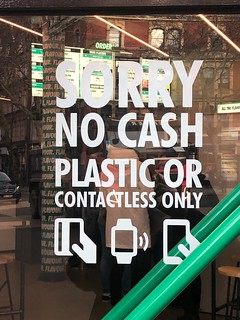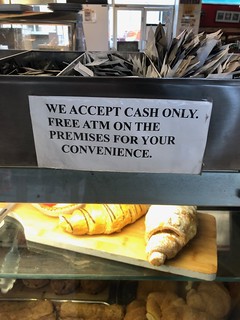A young relative of mine was coerced into spending this last week end at an English holiday camp resort. When she got there she was shocked to discover that, for whatever reason, they were cash only for the weekend! All over the complex were "cash only” signs! Remember, these signs are completely unfamiliar to anyone under the age of 30, especially from the South East of the country where Transport for London triggered the contactless revolution, because this a debit card generation in a country where more than half of card transactions are already contactless. Signs like this one would be invisible to her!
So here’s a normal young person, all of her money is in the bank and she never goes to ATMs, so imagine her further horror of having to use an ATM on site to get cash which then charged her £1.50 to get her own money. Even more punishing was the fact she had to go back to the ATM again for more cash so yet another £1.50 charge!!!
The question she asked over and over again during her stay was why in this day and age would such a large complex be cash only? Doesn't anyone there have an iZettle or a PayPal account? That doesn't seem like much of an investment when surely with so much cash around it could mean some staff creaming it off? A temptation surely. In this situation cash is expensive for the individual but it is also expensive for the organisation as a whole! Especially when you remember that cash has a lot of other hidden costs: armoured cars taking money to banks, the extra hour for workers to reconcile the till, robberies.
There’s no excuse for making people use cash in 2019.


Comments
Post a Comment